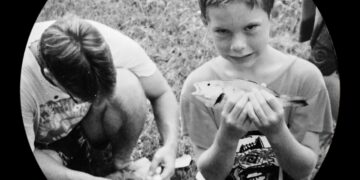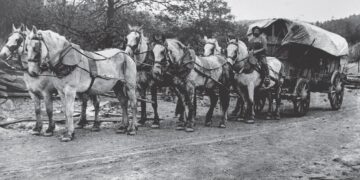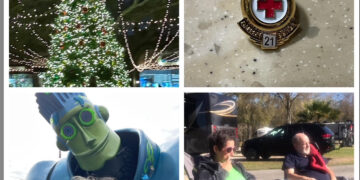
It seems, this time of year, like clockwork, skunks are emerging from their dens, feeling amorous, and seeking out a mate. With their bad eyesight, but keen sense of smell, they follow their noses toward food and love. Unfortunately, many meet a less than happy fate, while waddling across the backroads and highways in search of love. It brings to mind the old Loudoun Wainwright song, Dead Skunk in the Middle of the Road. Driving from my house to Broadway, I counted at least 5 the other day, who lost their battle overnight, on that road to love. Regardless, we should be seeing baby skunks waddling single file after their mothers, sometime in April through June.
I’m sure most of our country dogs have had a run in or two, or more, with a wandering skunk. I know mine has, more than once.
When we had beehives on the property, the skunks discovered them, and my dog and I bore the brunt of some irate bees who were none too pleased by the previous evening’s skunk attack on their hives. Some furring strips lined with tacks around the hives, put down by the bee keeper, kept the skunk and her brood from helping themselves to bees from that day forward.
Don’t get me wrong, I like skunks. I just don’t like the dog getting sprayed by them, or them trying to pull a silkie hen through the chicken wire fence. I don’t appreciate snakes or skunks trying to get chicken eggs either!
When I was a child, and volunteered for a wildlife rehabber, there was a resident skunk, de-scented, of course, named Flower, who ambled blindly around the house, looking for snacks and scratches behind her ears. She was fat, and cute!
My first encounter with a wild skunk, was when we first moved here, and one skunk was on a mission, waddling at top speed down the old road by my house, coming right at me.! I thought it would turn off into the woods, but no, kept heading straight in my direction! So, I jumped off the road into the waist high grass and headed back to the house. At that moment, snakes in the grass seemed less scary than being sprayed by a skunk!
There are 9 or 10 states that allow captive bred skunks as an exotic pet, with proper vaccines, de scenting, and permits. Virginia is not one of them. The lifespan of a pet skunk can be up to 10 years, a wild skunk is usually 3, if they do not fall prey to the wheels of a vehicle. If you are really into skunks, attend the annual Skunk Fest in Ohio!
The most common skunk here is the striped version, but there are 3 other types in North America – Eastern Spotted, Hooded, and Hog-nosed. The last two are common to the Mid and South west.
These black and white critters are opportunists in their choice of dens- brush piles, abandoned burrows, hollowed out logs, and under porches will do. They will dig their own underground burrows as a last resort. Except for mating season, they appear to be solitary in nature.
Skunks do have a varied diet, so, if you don’t have beehives to worry about, or easy access chicken coops, their diets can be very beneficial to your gardens. Grubs, grasshoppers, beetles, mice, and mushrooms fill out their diet. But, if you are a fan of a manicured lawn, they can wreak havoc on your grass, digging for those delicacies!
I’ve heard of one old timey remedy for curing what ails you- skunk grease. Not sure how that is made, but am positive skunks are not a fan, and I sure wouldn’t want to try that concoction!
While skunks may not be the best harbingers of spring’s arrival, they are letting us know it is on the way! I know I can’t wait!
All is well, here on a sunny and blustery Mountain Meadows’ afternoon…….
































